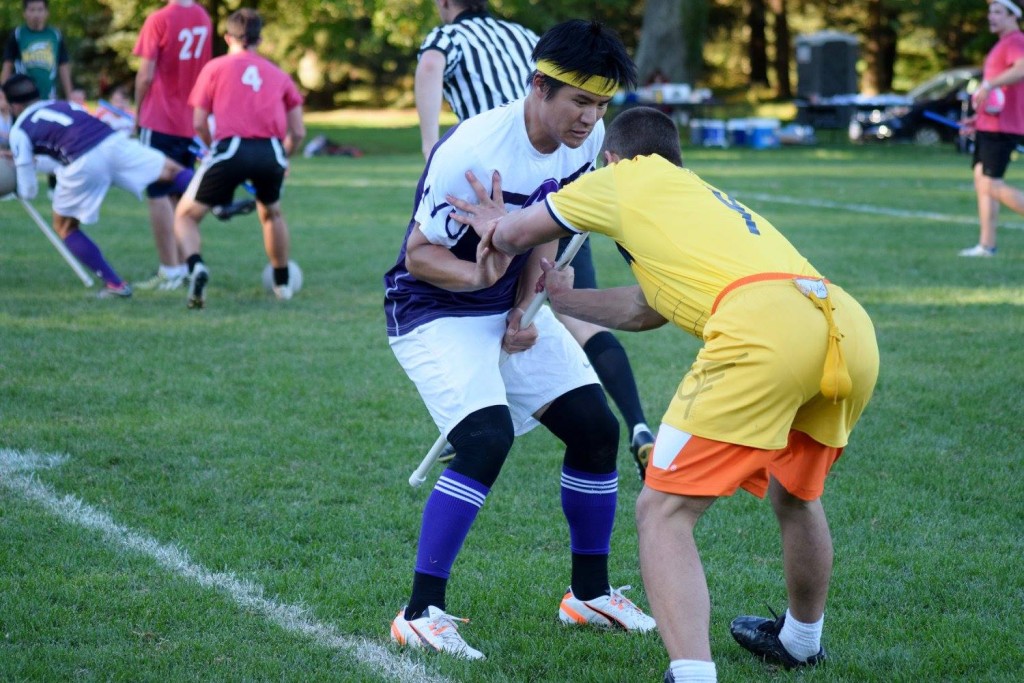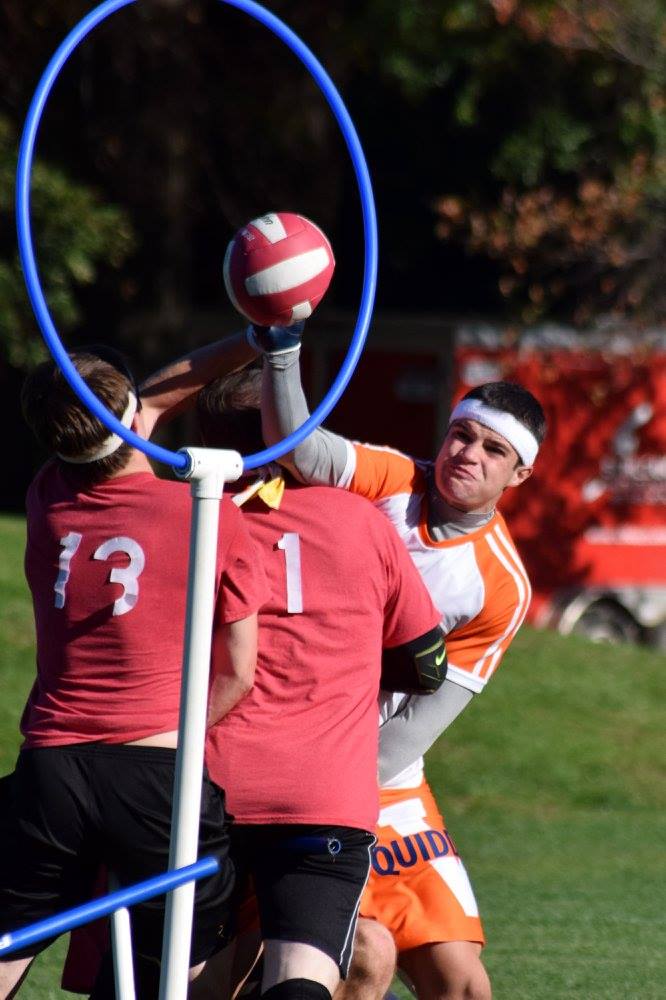Antwerp QC, Much of Belgian Core, Leaves Competitive Quidditch
Losing the Thunder After Bringing the Thunder
The NYU Thunder won Jack McGovern’s second annual Keystone Cup last weekend, with a 5-0 SWIM but, after Tuesday, the Thunder’s No. 10 ranking will surely vanish. Despite what seemed to be a successful weekend in which NYU didn’t lose a game, Kyle Jeon made the decision to leave the team he was formerly the captain of to play for Quidditch Club Boston.
NYU looked almost exactly the same at Keystone as it had all season. The team approached the each game with cohesive strategies that varied slightly based on the style of play its opponent preferred. Jeon, who is known for his talents as a beater, did what he usually does and nonchalantly switched from position to position based on what the team needed in a given game. Chasing most of the day, Jeon only put on a black headband for NYU’s semi-final game against DCQC and even sought more than he beat, grabbing three snitches over the course of the day. Not only that, but he didn’t play at all in the finals.
So why leave a successful team that he has been part of for his entire career?
After transferring, Jeon said he didn’t want to get in the way of the development of his team. He didn’t want to stop budding leaders like Kyle Carey and Zack Gindes from realizing their full potential or steal playing time from competent beaters like Stanford Zhou and Dylan Meehan who have the potential to grow and stay with NYU in the future.
I’ve heard a good bit of skepticism regarding that philosophy. It even seems like some people think Jeon is being deceptive or that he’s lying about his intentions. I’m no expert on Jeon and I’m not going to claim that I know what’s going on in that kid’s head. I don’t think anyone wants to know what’s going on in his head–Jeon’s a weird dude.
But I’d like to explain why there shouldn’t be any reason to question his intentions, and I’ll do so the best way I know how–with an anecdote.
After the MLQ championships saw Jeon turn a solid New York beating corps into an elite-level squad, I was fortunate enough to spend eight or more hours in a car with him. Jeon had just made the East Division’s MVP, Max Havlin, look human. He did so on the pitch as a player and off the pitch by coaching his teammates from the sidelines. In between games, Jeon led discussions about strategy with his teammates despite not having been at a series the entire regular season. Why wouldn’t he? It was working.
Sitting in a car as long as we were, Jeon and I took some time exchanging war stories and reminisce on the weekend that was, but then Jeon said something that stuck with me more than anything else.
“Did I talk too much?”
I almost didn’t even know how to respond.
Jeon continued to explain that he felt bad for being missing-in-action all season and didn’t want to step on any toes by being vocal. The clear answer was that he was crazy for even letting that idea creep into his head. He was one of the biggest differences in forcing the only snitch-range games the Boston Night Riders faced all season. That’s just Jeon’s personality, though.
As I thought about his decision to transfer to QC Boston, I couldn’t help but think about my own situation with UNC. Having been a captain at UNC, I realized after I graduated, that there comes a time when you have to let your kids go. You’ve spent hours developing the team into something. The last thing you want to do is stand over the shoulder of current leadership. Your presence alone is enough to suffocate people who, in many cases, you trained to lead when you left.
Again, I’m not going to say, I know for a fact what Jeon’s intentions are, but in the limited time I’ve gotten to know him, there’s no reason to think he’s being anything other than genuine.
PS: Stop accusing QC Boston of poaching. Nobody cares.
A Tournament To Mess With Your Head
In on-field-related news, a high schooler proved, yet again, that he’s better at running tournaments than most college teams. As previously stated, NYU won McGovern’s second-annual tournament with a perfect record, but that was hardly the most newsworthy thing to happen during the gauntlet of an eight-team tournament that was Keystone Cup.
It only made sense that NYU, a capable team with a notorious knack for grinding its way through close games, would win. Parity ruled the day as seven pool play games involved SWIM grabs and all but one bracket play game was played in snitch range.
While NYU and The Warriors were the only ranked teams going into the day, both showed vulnerability to teams that haven’t gotten close to the same amount of media attention. NYU didn’t managed to overwhelm any team it played and had to rely on its ability to catch snitches in all of its games to win. They were even pushed out of range for a small period of time against DCQC’s top chasing line.
The Warriors lost two games on the day and seemed to be the exact same team they were last year. While the squad can consistently produce talented chasers, the team’s habitually mediocre beating game held them back against teams like RPI and Virginia that each display a similar play style.
On offense, RPI and UVA slowed the game down with a methodical, patient passing game and only attacked when the chances of success were high. The Warriors’ inability to blow up those attacks with calculated aggressive beating allowed possessions to drag out and keep their opponents in the game.
Defensively, Virginia’s unorthodox zone defense and RPI’s beating strength each gave The Warriors offensive fits. While this doesn’t come as a surprise to most people at this point, seeing it all play out live made it all the more clear. If The Warriors are going to live up to the No. 15 ranking, the team will have to find more consistency in its beating game against high-caliber beaters and be able to score more reliably against the zone defenses that have made them struggle in the past.
While it could be construed that The Warriors were “playing down to its competition,” RPI proved that it was no pushover on its way to the finals of the tournament. While the team is frequently overlooked in the Northeast because of its weak scheduling, the team only lost two games Saturday, and both losses were in snitch range. Though those sorts of results would typically be considered solid for any team, what impressed me most about RPI was how it did it and who it did it without.
During the summer, chaser Teddy Costa made a name for himself on the Boston Night Riders by bobbing and weaving through defenses seamlessly, but on Saturday, RPI was forced to get buckets without the savvy former baseball player. That theoretically put increased pressure on beater Mario Nasta to control games but, in reality, it turned into a chance for Nasta to show off.
At times, it was almost like he wasn’t even trying. He wasn’t even breaking a sweat. RPI turned every game into a clinic of passes and possessions offensively, and Nasta had everything to do with it. He completely controlled the pace of entire games at a time and dictated the outcome almost single handedly with a commanding presence. The only issue that arose from Nasta’s dominating performances was that toward the end of the day, particularly in the finals, his team’s reliance on him led to a lazy defensive series by chasers. Players like Gindes and Carey were running freely through RPI’s porous chasing defense and, at times, multiple competent chasers would go completely unmarked or noticed.
RPI clearly has a ways to go before it can be considered a regional powerhouse, but with Costa presumably back for the Northeast Regional Championship, it will be tough to come up with too many teams outside of QC Boston that they can’t beat.
If You Build It They Will Come… To Texas
And apparently they will come from pretty much anywhere.
Lone Star Quidditch Club announced that it will be holding a community team-only tournament called the Bat City Showcase in January and, just like bats, top-ranked community teams from across the country are flocking at the opportunity to congregate in one place to beat each other’s brains in.
By now, everyone has noticed the trend. Community teams are becoming stronger than ever relative to college teams. As more players graduate, community teams grow strong as the college-level programs are forced to continually rebuild year after year.
It doesn’t seem like USQ, under newly-appointed leadership, is going to make any sort of drastic or immediate changes to the current system and separate community teams from their collegiate counterparts. So it only makes sense that the most highly-touted community team in the game take the situation into its own hands.
While this won’t officially be recognized as the Community World Championship, it will do as a fine substitute, and it will show the league that, in the next year, post-season play should divide community and college teams. Many people have written and spoken about potential ways to make this separation work logistically, but this tournament, if run well, will be the final piece of evidence the league needs to support a change.
Archives by Month:
- April 2025
- May 2023
- April 2023
- April 2022
- January 2021
- October 2020
- September 2020
- July 2020
- May 2020
- April 2020
- March 2020
- February 2020
- January 2020
- December 2019
- November 2019
- October 2019
- August 2019
- April 2019
- March 2019
- February 2019
- January 2019
- November 2018
- October 2018
- September 2018
- August 2018
- July 2018
- June 2018
- April 2018
- March 2018
- February 2018
- January 2018
- November 2017
- October 2017
- July 2017
- June 2017
- May 2017
- April 2017
- March 2017
- February 2017
- January 2017
- December 2016
- November 2016
- October 2016
- September 2016
- August 2016
- July 2016
- June 2016
- May 2016
- April 2016
- March 2016
- February 2016
- January 2016
- December 2015
- November 2015
- October 2015
- September 2015
- August 2015
- July 2015
- June 2015
- May 2015
- April 2015
- March 2015
- February 2015
- January 2015
- December 2014
- November 2014
- October 2014
- September 2014
- August 2014
- July 2014
- May 2014
- April 2014
- March 2014
- February 2014
- January 2014
- November 2013
- October 2013
- September 2013
- August 2013
- July 2013
- June 2013
- May 2013
- April 2013
- March 2013
- February 2013
- January 2013
- December 2012
- November 2012
- October 2012
Archives by Subject:
- Categories
- Awards
- College/Community Split
- Column
- Community Teams
- Countdown to Columbia
- DIY
- Drills
- Elo Rankings
- Fantasy Fantasy Tournaments
- Game & Tournament Reports
- General
- History Of
- International
- IQA World Cup
- Major League Quidditch
- March Madness
- Matches of the Decade
- Monday Water Cooler
- News
- Positional Strategy
- Press Release
- Profiles
- Quidditch Australia
- Rankings Wrap-Up
- Referees
- Rock Hill Roll Call
- Rules and Policy
- Statistic
- Strategy
- Team Management
- Team USA
- The Pitch
- The Quidditch Lens
- Top 10 College
- Top 10 Community
- Top 20
- Uncategorized
- US Quarantine Cup
- US Quidditch Cup



